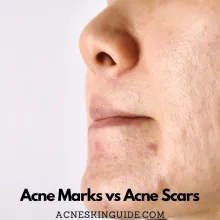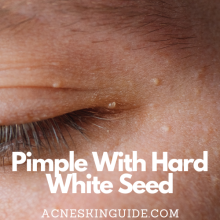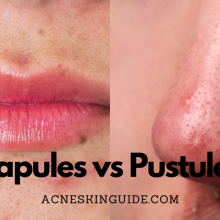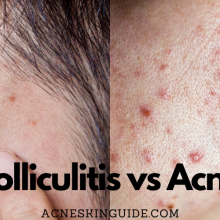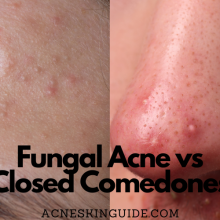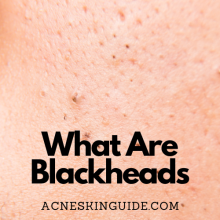Adult Acne | Acne Skin Guide
Adult acne is a prevalent issue, affecting up to 25% of men and 15% of women. Hormonal fluctuations, stress, diet, genetics, medications, and environmental factors can contribute to its development. Adult acne can manifest as cystic or nodular lesions, whiteheads, blackheads, or acne mechanica from friction. Treatment options range from over-the-counter topicals like benzoyl peroxide and retinoids, to prescription oral medications and in-office procedures.
Lifestyle changes like a healthy diet, stress management, and proper skincare can help prevent and manage breakouts. Acne scarring and the psychological impact are also concerns, requiring treatments like laser therapy or counseling. While effective treatments exist, some can have side effects or require patience and consistency to see results. A tailored, multi-faceted approach is key for achieving clearer skin.
#1 Recommended Acne Treatment | #2 Recommended Acne Treatment |
 |  |

Adult Acne: An Increasingly Common Skin Concern
While acne is often associated with teenagers going through puberty, an increasing number of adults are battling this frustrating and sometimes embarrassing skin condition. In fact, studies estimate that up to 15% of women and 25% of men experience adult acne, dispelling the myth that it’s solely a teenage problem.
Why Adult Acne Happens
There are several potential causes behind the development of adult acne. One of the primary factors is hormonal fluctuations, particularly in women during menstrual cycles, pregnancy, and menopause. During these times, changes in hormone levels can stimulate increased oil production, clogging pores and leading to breakouts.
Stress is another significant contributor to adult acne. When the body is under stress, it produces higher levels of cortisol and other hormones that can trigger excess oil production and inflammation, exacerbating acne.
Diet and lifestyle factors can also play a role. Diets high in refined carbohydrates, dairy, and unhealthy fats have been linked to increased acne severity. Poor sleep, smoking, and excessive alcohol consumption can also worsen breakouts.
Genetics and certain medications, such as corticosteroids, lithium, and some birth control pills, may also increase the risk of adult acne.
Additionally, environmental factors like pollution, humidity, and weather changes can aggravate acne by causing increased oil production and skin irritation.
Types of Adult Acne
Adult acne can take different forms, including:
- Hormonal acne: Often characterized by deep, painful cystic or nodular acne lesions on the lower face, jaw, and neck.
- Acne vulgaris: Includes whiteheads, blackheads, papules, and pustules, typically appearing on the face, shoulders, and back.
- Acne mechanica: Caused by friction, pressure, or occlusion from helmets, tight collars, or backpacks rubbing against the skin.
Over-the-Counter Treatments
For mild to moderate adult acne, over-the-counter treatments can be effective. Topical products containing benzoyl peroxide, salicylic acid, or retinoids can help unclog pores and reduce inflammation. Natural remedies like tea tree oil, aloe vera, and green tea may also provide relief for some individuals.
Establishing a consistent skincare routine tailored to acne-prone skin is crucial. This may include using a gentle, non-comedogenic (non-pore-clogging) cleanser, exfoliating regularly, and using a non-comedogenic moisturizer to prevent dryness and irritation.
Spot treatments, such as hydrocolloid bandages or pimple patches, can also be helpful for targeting individual blemishes.
Prescription Treatments
For more severe or persistent adult acne, prescription treatments may be necessary. Dermatologists may prescribe oral medications like antibiotics, birth control pills, spironolactone (a diuretic), or the powerful isotretinoin (Accutane). These medications can help regulate hormone levels, reduce oil production, and fight bacteria that contribute to acne.
Topical prescription treatments, such as tretinoin, adapalene, and clindamycin, can also be effective in unclogging pores and reducing inflammation.
In-office procedures like chemical peels, microdermabrasion, and light therapy (including blue light, red light, and photodynamic therapy) can help improve skin texture, kill acne-causing bacteria, and reduce inflammation.
Lifestyle Changes and Prevention
In addition to medical treatments, making certain lifestyle changes can help prevent adult acne flare-ups and improve overall skin health.
Maintaining a balanced diet rich in antioxidants, fiber, and healthy fats, while limiting refined carbohydrates, dairy, and unhealthy fats, may help reduce acne severity.
Stress management techniques like yoga, meditation, and exercise can help regulate hormone levels and reduce inflammation.
Proper skincare habits, such as gentle exfoliation and cleansing, can keep pores clear and prevent buildup of dirt, oil, and bacteria.
Staying hydrated and using non-comedogenic moisturizers can prevent dryness and irritation, which can worsen acne.
Avoiding triggers like certain makeup, hair products, and occlusive clothing can also help prevent breakouts.
Dealing with Acne Scarring
Acne can sometimes leave behind various types of scars, including atrophic (depressed), hypertrophic (raised), and hyperpigmented scars.
Over-the-counter scar treatments containing ingredients like vitamin C, retinoids, and alpha hydroxy acids may help reduce the appearance of scars, but results can be limited.
Professional treatments like laser therapy, microneedling, and chemical peels can be more effective for more severe scarring, but they can be costly and may require multiple sessions.
Makeup techniques using color-correcting concealers and strategic highlighting can help camouflage acne scars temporarily.
Adult Acne and Mental Health
Beyond the physical symptoms, adult acne can take a toll on one’s self-esteem and mental well-being. The emotional impact of adult acne should not be underestimated, as it can lead to anxiety, depression, and social withdrawal in some cases.
It’s important to acknowledge the psychological impact and seek support if needed. Strategies like cognitive-behavioral therapy, stress management, and self-care practices can help individuals cope with the emotional stress of adult acne.
When to See a Dermatologist
If over-the-counter treatments aren’t providing relief, or if acne is severe, persistent, or causing scarring or discoloration, it’s recommended to seek professional help from a dermatologist. They can provide personalized treatment plans and address any underlying conditions contributing to adult acne.
Downsides and Considerations
While there are many effective treatments for adult acne, it’s important to be aware of potential downsides and considerations.
Some prescription medications, such as isotretinoin (Accutane), can have serious side effects and require close monitoring by a dermatologist.
In-office procedures like chemical peels and laser therapy can be costly and may require multiple sessions for optimal results.
Some acne treatments, particularly those containing drying ingredients like benzoyl peroxide, can cause irritation, redness, and peeling, especially when first starting treatment.
It’s important to be patient and consistent with acne treatments, as it can take several weeks or months to see significant improvement.
Managing adult acne requires a multi-pronged approach tailored to individual needs. By understanding the causes, exploring various treatment options, and making lifestyle changes, it’s possible to achieve clearer, healthier skin and improve overall well-being.
#1 Recommended Acne Treatment | #2 Recommended Acne Treatment |
 |  |
Summary and FAQs
Does birth control help with adult acne?
Yes, birth control pills can be an effective treatment for adult acne, especially hormonal acne in women. Here’s how birth control can help with adult acne:
- Regulates hormones: Birth control pills contain synthetic forms of the hormones estrogen and progestin. These hormones help regulate the body’s natural hormone levels, which can reduce the production of androgens (male hormones) that contribute to acne.
- Decreases oil production: Androgens stimulate the sebaceous glands to produce excess oil (sebum), which can clog pores and lead to acne breakouts. By regulating hormone levels, birth control pills can decrease oil production and prevent clogged pores.
- Reduces inflammation: Some birth control pills have anti-inflammatory properties, which can help reduce the inflammation associated with acne lesions.
- Prevents ovulation: By preventing ovulation, birth control pills can help stabilize hormone levels throughout the menstrual cycle, reducing cyclical acne flare-ups that some women experience.
However, it’s important to note that not all birth control pills are equally effective for treating acne, and some formulations may even worsen acne in certain individuals. Pills containing drospirenone or norgestimate are generally considered more effective for acne than those containing other progestins.
It’s also worth mentioning that it can take several months for birth control to take full effect in improving acne, and some women may experience an initial flare-up before their skin clears up. Additionally, birth control is not a suitable option for everyone, and potential risks and side effects should be discussed with a healthcare provider.
Can adult acne be a sign of an underlying health condition?
Yes, adult acne can sometimes be a sign of an underlying health condition. While hormonal imbalances, stress, diet, and genetics are common causes of adult acne, there are certain health conditions that can also contribute to or cause acne breakouts in adults. Here are some examples:
- Polycystic Ovary Syndrome (PCOS): This hormonal disorder in women causes increased production of androgens (male hormones), which can lead to acne, particularly along the jawline and chin.
- Endocrine disorders: Conditions that affect hormone levels, such as thyroid disorders, Cushing’s syndrome, or hormonal imbalances caused by tumors, can trigger or worsen acne.
- Pregnancy: The hormonal changes that occur during pregnancy can cause or exacerbate acne in some women.
- Menopause: Fluctuating hormone levels during menopause can also contribute to adult acne.
- Medications: Certain medications, such as corticosteroids, lithium, and some psychiatric drugs, can have side effects that include acne.
- Underlying inflammatory conditions: Chronic inflammatory conditions like inflammatory bowel disease (IBD) or certain types of arthritis can sometimes manifest with skin symptoms, including acne.
- Tumors: Rarely, certain types of tumors that produce hormones, such as ovarian or adrenal tumors, can cause acne as a symptom.
If adult acne persists despite appropriate treatment or appears suddenly and severely, it is advisable to consult a dermatologist or healthcare professional to rule out any underlying medical conditions. In some cases, treating the underlying condition may help resolve or improve the acne.
How do I choose the right acne treatment for my skin type?
Choosing the right acne treatment for your skin type is crucial to ensure effectiveness and avoid potential irritation or dryness. Here are some tips for selecting acne treatments based on your skin type:
- Oily skin:
If you have oily skin, look for oil-free and non-comedogenic (non-pore-clogging) products. Ingredients like benzoyl peroxide, salicylic acid, and retinoids can be effective for oily, acne-prone skin. Avoid heavy, greasy moisturizers and opt for lightweight, oil-free formulations. - Dry skin:
For dry skin, gentle, non-drying treatments are recommended. Benzoyl peroxide can be too drying, so try lower concentrations or alternate it with a gentle, non-comedogenic moisturizer. Retinoids and salicylic acid may also be drying, so use them sparingly and follow up with a moisturizer. Look for products with hydrating ingredients like hyaluronic acid or glycerin. - Sensitive skin:
Those with sensitive skin should use caution with harsh or drying acne treatments. Start with lower concentrations of active ingredients and introduce them slowly. Look for gentle, fragrance-free formulations and opt for natural alternatives like tea tree oil or azelaic acid. Avoid irritating ingredients like alcohol or strong exfoliants. - Combination skin:
If you have combination skin (oily in some areas and dry in others), use a gentle, oil-free cleanser and spot-treat oily areas with acne medications. Use a lightweight, non-comedogenic moisturizer and apply acne treatments only to the oily, acne-prone areas. - Consult a dermatologist:
If you’re unsure about your skin type or the best treatment for your acne, it’s always a good idea to consult a dermatologist. They can evaluate your skin and recommend the most appropriate treatment plan tailored to your specific needs.
Remember, it may take some trial and error to find the right acne treatment for your skin type. Start with gentle, non-irritating products and gradually increase the strength or frequency of use as tolerated. Be patient and consistent, as it can take several weeks or months to see significant improvement.
Can adult acne be prevented?
Yes, there are several preventive measures that can help reduce the risk of developing adult acne or minimize its severity:
- Maintain a consistent skincare routine:
Follow a gentle, non-comedogenic (non-pore-clogging) skincare routine that includes cleansing, exfoliating, and moisturizing. Avoid harsh scrubbing, which can irritate the skin and worsen acne. - Choose non-comedogenic products:
Use oil-free, non-comedogenic makeup, sunscreens, and hair products that are labeled “non-acnegenic” or “won’t clog pores.” These products are less likely to contribute to clogged pores and breakouts. - Practice good hygiene:
Regularly wash your face with a gentle cleanser, especially after sweating or wearing helmets, hats, or other headgear that may trap oil and bacteria against the skin. - Manage stress:
High stress levels can trigger hormonal imbalances and inflammation, which can exacerbate acne. Practice stress-relieving techniques like yoga, meditation, or exercise to help manage stress. - Maintain a healthy diet:
A diet rich in antioxidants, fiber, and healthy fats, and low in refined carbohydrates, dairy, and unhealthy fats, may help reduce acne flare-ups. - Stay hydrated:
Drinking plenty of water can help flush out toxins and keep the skin hydrated, which can prevent excess oil production and clogged pores. - Avoid harsh scrubbing or picking:
Harsh scrubbing or picking at pimples can irritate the skin and worsen acne, potentially leading to scarring. - Consider preventive treatments:
For those with a history of adult acne or a high risk of developing it, your dermatologist may recommend preventive treatments, such as topical retinoids or spironolactone (for women), to help control oil production and prevent breakouts.
While it may not be possible to completely prevent adult acne, adopting these preventive measures can help minimize the risk and severity of breakouts, promoting clearer, healthier skin.
How do I deal with acne during pregnancy?
Dealing with acne during pregnancy can be a challenge, as some acne treatments may not be safe for the developing baby. However, there are steps you can take to manage acne during this time:
- Consult your dermatologist or obstetrician: It’s important to consult with a healthcare professional before using any acne treatments during pregnancy. They can recommend safe and effective options for your specific situation.
- Use pregnancy-safe topical treatments: Some topical treatments are generally considered safe for use during pregnancy, such as glycolic acid, azelaic acid, and some forms of benzoyl peroxide and salicylic acid (in low concentrations). Your dermatologist can guide you on the appropriate strengths and usage.
- Avoid certain oral medications: Oral acne medications like isotretinoin (Accutane), spironolactone, and certain antibiotics are not recommended during pregnancy due to potential risks to the developing fetus.
- Consider professional treatments: In-office procedures like chemical peels, microdermabrasion, and light therapy may be safe options for managing acne during pregnancy when performed by an experienced dermatologist or aesthetic professional.
- Maintain a gentle skincare routine: Use gentle, non-comedogenic (non-pore-clogging) cleansers, moisturizers, and makeup products to avoid further irritation or clogging of pores.
- Manage stress and hormones: Pregnancy can cause hormonal fluctuations and increased stress, both of which can contribute to acne flare-ups. Practice stress-relieving techniques and stay hydrated to help manage hormonal changes.
- Avoid picking or squeezing: Resist the urge to pick or squeeze pimples, as this can lead to further inflammation, infection, and potential scarring.
- Consider diet modifications: While the connection between diet and acne is not fully understood, some pregnant women may find that limiting certain foods like dairy, processed foods, or high-glycemic foods can help improve their acne.
Remember, acne during pregnancy is common, and with the right approach and guidance from your healthcare team, it can be managed effectively while prioritizing the health and safety of both you and your baby.

